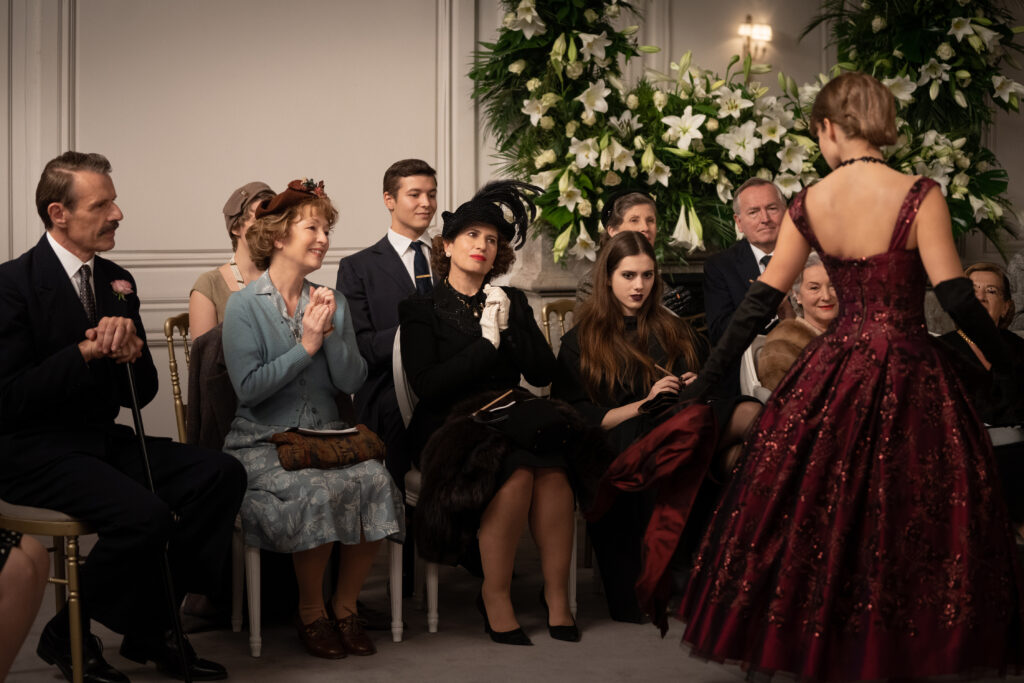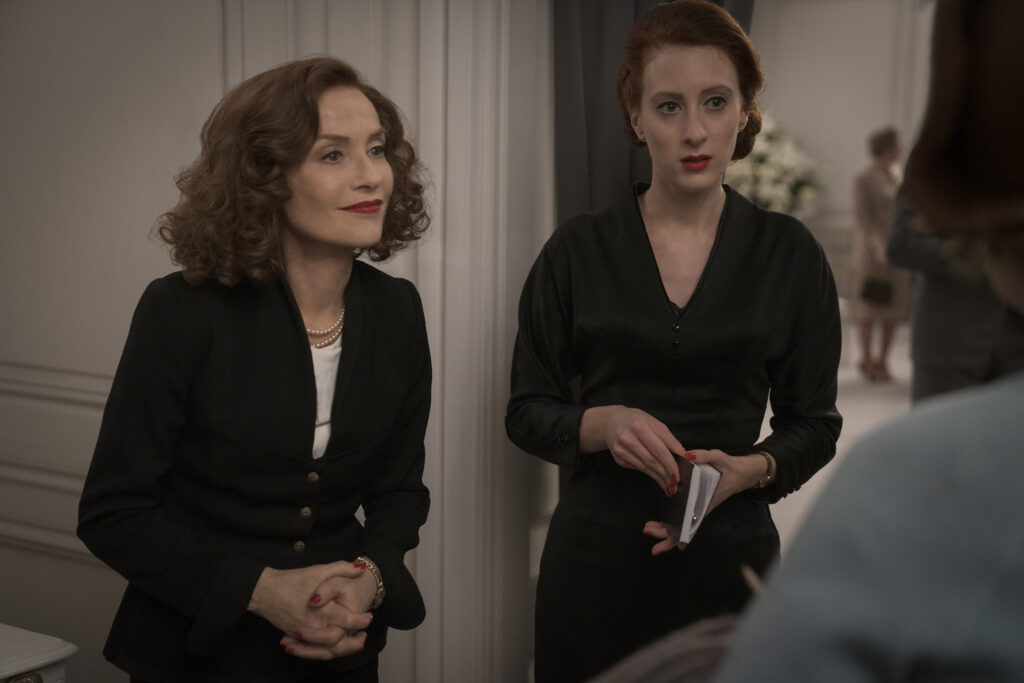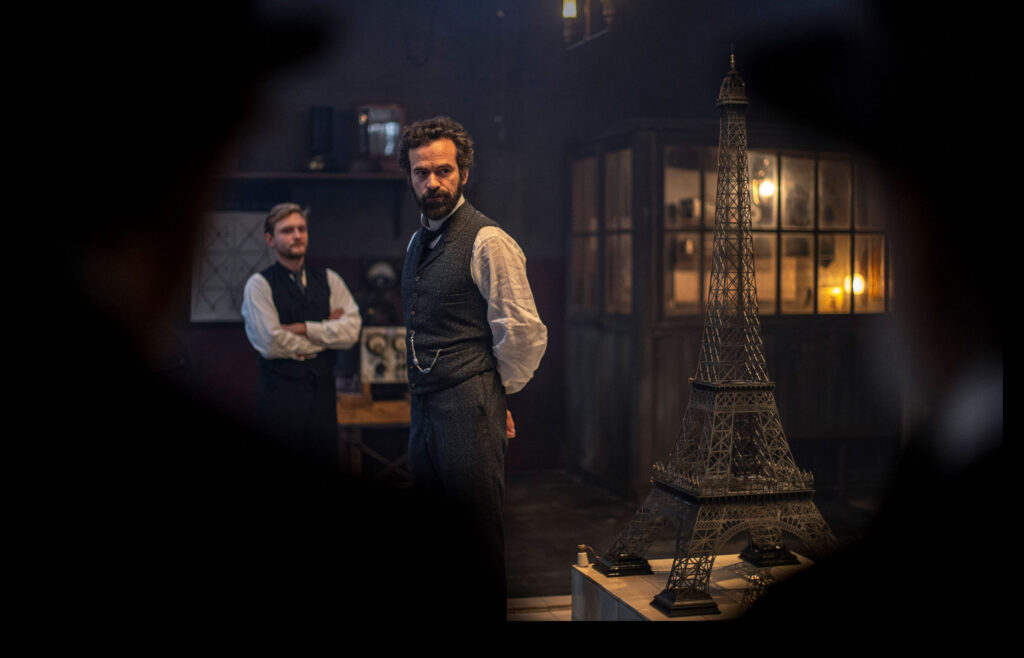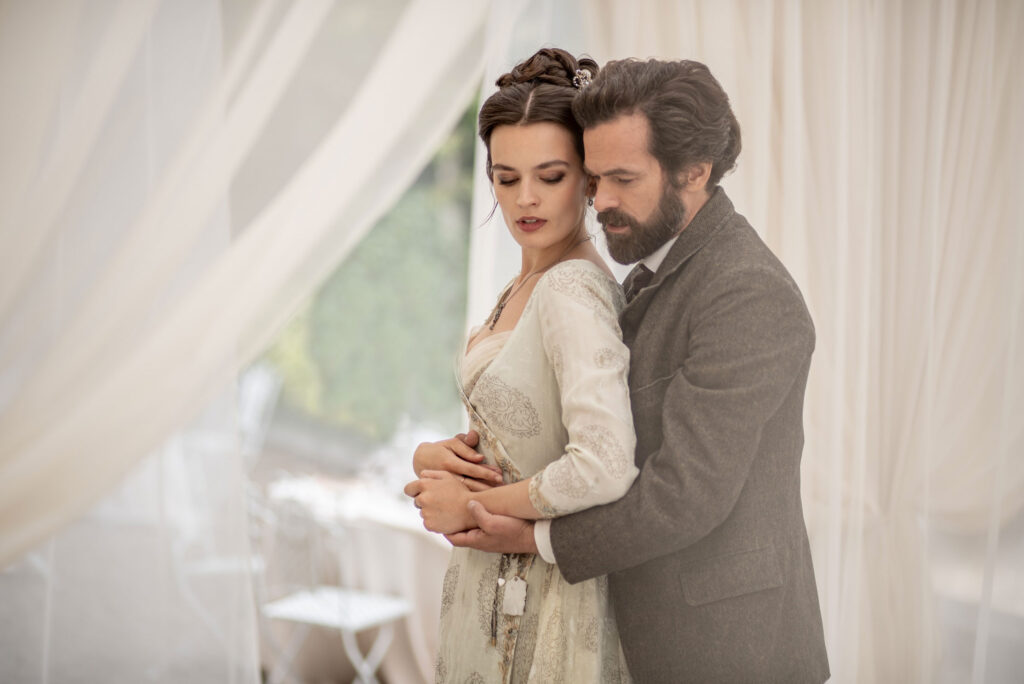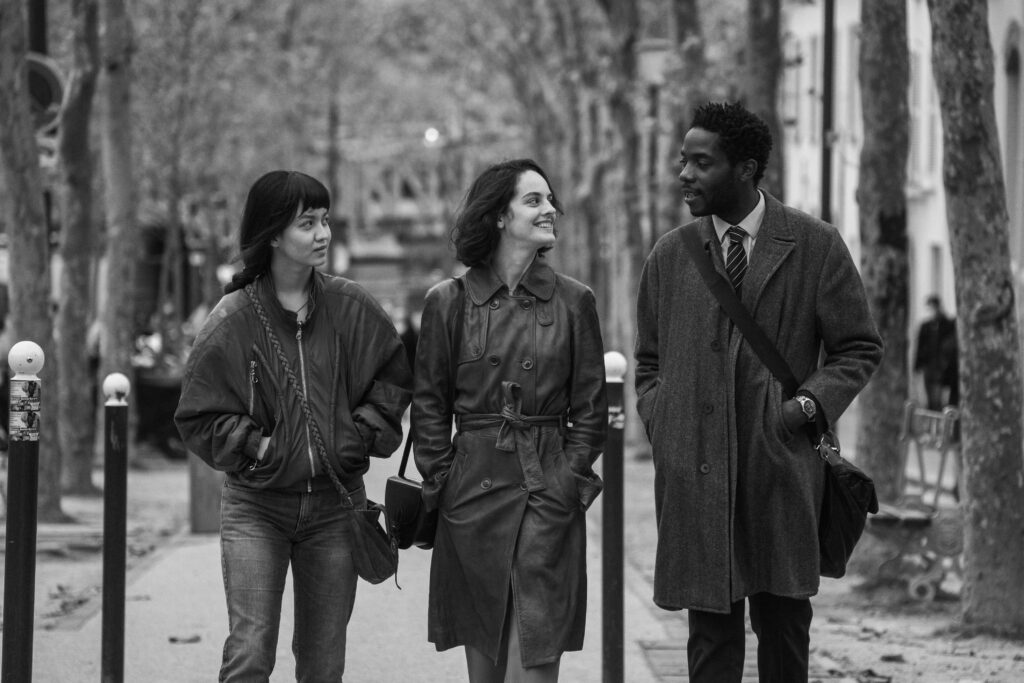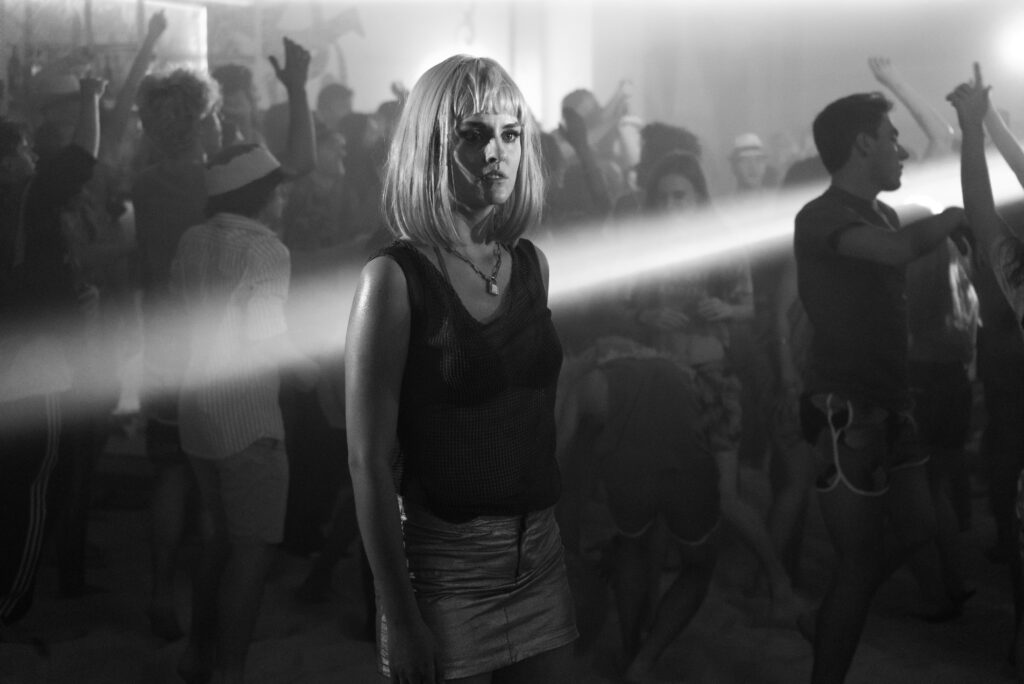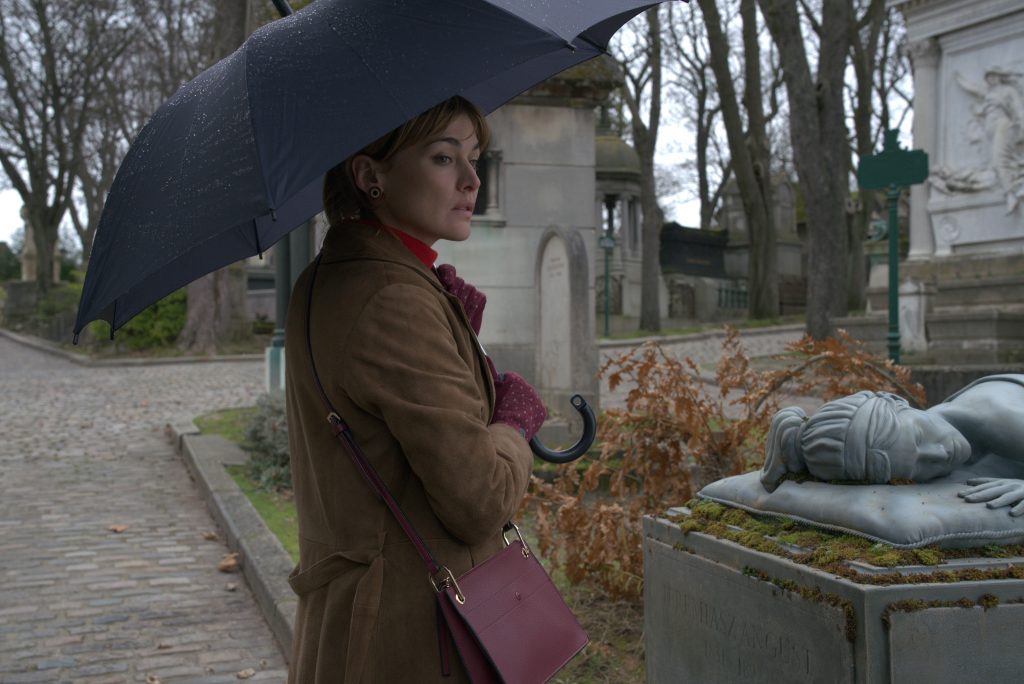June 18, 2023
by Carla Hay

Directed by Maggie Contreras
Some language in French, Greek and Polish with subtitles
Culture Representation: Taking place in 2022, in France, Greece, the United States, and Poland, the documentary “Maestra” features a predominantly white group of people (with a few black people and Asians) who are connected in some way to the international classical music industry.
Culture Clash: Five women go to Paris to compete in the 2022 La Maestra competition, the only all-female contest for classical music orchestra conductors.
Culture Audience: “Maestra” will appeal primarily to classical music fans and people who are interested in watching an engaging documentary about women in a male-dominated profession.

“Maestra” offers a riveting look at the challenges and triumphs experienced by five contestants competing in the all-female La Maestra competition for classical orchestra conductors. In total, there were 14 contestants chosen for the 2022 La Maestra competition in Paris, where most of this documentary was filmed. The musicianship is excellent, but the human stories have more impact. “Maestra” had its world premiere at the 2023 Tribeca Festival.
Directed by Maggie Contreras, “Maestra” doesn’t do anything innovative or groundbreaking in filmmaking, but this documentary does excel in choosing interesting contestants and in how the film editing skillfully weaves their stories together. All five of the contestants who are the focus of this movie have personalities and backgrounds that are very different from each other. Unless a viewer is not paying attention, it’s very easy to tell these contestants apart.
These are the five contestants who get the spotlight in the documentary:
- Mélisse Brunet is a bachelorette originally from France but currently lives in the United States. At the time this documentary was filmed, Brunet was working as a classical music teacher in Iowa City, Iowa. Brunet is a self-admitted neurotic who expresses many times during the film that she’s nervous about going back to her hometown of Paris, because it will bring back traumatic memories for her.
- Tamara Dworetz is an American living with her husband Stephen Delman in Atlanta. Dworetz has an optimistic and upbeat personality. She and her husband, who been married since 2018, are trying to start a family. Dworetz worries about when the right time would be for her to become a mother and how parenthood might affect her career.
- Anna Sułkowska-Migoń is Polish and living with her husband Maciej Migoń in Warsaw, Poland. Sułkowska-Migoń is the youngest and least-experienced of the five contestants featured in the documentary. At the time this documentary was filmed, Sułkowska-Migoń was in her last year of college and had only started being a conductor in the previous year.
- Zoe Zeniodi (based in her native Athens, Greece) is an outspoken single mother to twins (a son and a daughter), who were about 4 to 6 years old when this documentary was filmed. Zeniodi is a freelance conductor, so she has to do a lot of traveling to wherever her work takes her. Zeniodi says she has constant challenges in balancing her career with parenting very young children.
- Ustina Dubitsky, who is from Ukraine, is introduced much later in the documentary than the other four subjects. She’s not shown in her home because by the time Dubitsky is seen in Paris for the competition, the Ukraine had been invaded by Russia and engaged in a brutal war. Understandably, this turmoil weighs heavily on quiet and introverted Dubitsky during the Maestra competition.
Although all of these contestants have compelling stories, it’s fairly obvious that the “Maestra” filmmakers thought that Brunet is the most fascinating one out of the five, because she gets the most screen time. The movie also opens with a scene of Brunet teaching a class in Iowa City. Brunet is the one who seems the most intense about winning the competition because she’s a mid-career contestant who needs the exposure of La Maestra so that she can get a professional job with an orchestra instead of only being a teacher.
Brunet also keeps talking about experiencing trauma that happened to her in Paris and being afraid of going back to Paris because of this trauma. Brunet says that this trauma left her so emotionally affected, she is living with anxiety and depression. Clearly, the filmmakers of “Maestra” were expecting Brunet to eventually reveals details of this trauma. And sure enough, Burnet does tell more information. Her trauma is exactly what you probably think it is.
Dworetz is the happy-go-lucky cheerleader in the group. She is the one who’s most likely to give pep talks and praise to other contestants. If she is feeling any fear or sadness, she likes to keep it private. Dworetz is seen briefly at home with her husband, who is completely supportive of her conductor ambitions.
Sułkowska-Migoń is also seen having a happy home life with her husband. In the documentary, Sułkowska-Migoń (who is eager and slightly insecure) gives a lot of credit to her mentor: her father Piotr Sułkowski, a classical musical conductor who has worked with the Warmia-Masuria Philharmonic Orchestra in Poland. Sułkowska-Migoń comments: “My father, he is the best conductor of my life.” Sułkowski is shown briefly in the documentary in a video conference call with her.
If Brunet is the one in the group who is the most emotionally fragile, then Zeniodi is the one who is the emotionally resielient and most tough-talking. However, she also shows a compassionate side, such as a moment of solidarity when she gives Dworetz some advice on being a parent juggling a career as an orchestra conductor. Zeniodi tells Dworetz that there never really is a perfect time in a female conductor’s career to have children but that working mothers in these siutations can learn as they go along.
Zeniodi has experienced significant ups and downs in her career, as a freelance conductor and as the oldest member of the five contestants. She mentions that she was fired from a conductor job in Athens because she was pregnant. Zeniodi does not elaborate on what she did about this discrimination, but it’s implied that she did nothing about it, out of fear of being blacklisted from the industry.
Because of her quiet personality, Dubitsky isn’t shown doing much talking in the documentary. When she does talk, she’s mainly preoccupied with what’s going on in her home country of Ukraine, because most of her family members and friends are at risk of being killed or injured during the war. Many people in the La Maestra competition express sympathy and empathy to Dubitsky for what she and her fellow Ukrainians are going through in her lives.
Aside from showing the five contestants’ interactions with each other, “Maestra” has a great deal of footage of the contestants rehearsing and performing. Music performed in the documentary includes pieces from Wolfgang Amadeus Mozart, Louise Farrenc and Maurice Ravel. Of the five contestants, Zeniodi moves around the most on stage while conducting. Dworetz has the quirkiest facial expressions while conducting; she has a tendency to lick her lips and quickly touch her nose. She might want to work on some of those quirks because they make her look really nervous or look like she’s under the influence of a stimulant.
Brunet comments in a “Maestra” documentary interview: “The only place where I’m really happy is when I open the score,” she says of the first step of a conductor’s performance. Dworetz says she likes to practice her conductor moves alone. She shares her philosophy on her conducting style: “You just have to conduct the music the way you want to go. It’s not really about the timing. It’s about the shape, the color, the character.”
Other people interviewed in “Maestra” are several La Maestra competition officials and other classical music experts. Interviwees include conductor Paul David, who is on the La Maestra selection committee; conductor Kwamé Ryan, who is a La Maestra judge; and conductor Kenneth Kiesler. Anaïs Smart and Aline Sam-Giao, who are both on the La Maestra selection committee, both say that the chemistry between a conductor and an orchestra can make or break a performance. An excellent conductor in the competition might have the bad luck of being paired an orchestra, resulting in little or no chemistry in the performance and the conductor contestant most likely to be eliminated from the competition.
Many of the interviewees also talk about how the conductor expresses emotions during the performance is a major factor in the judging process. An intangible “authenticity” is also frequently mentioned as a quality that sets apart the conductors who are considered to be very good and those who are considered to be outstanding. Passion is important during a performance, but a conductor can’t be too passionate to the point where it’s a distraction during the performance.
Deborah Borda, La Maestra chair and New York Philharmonic president/CEO, comments in the documentary: “One of the things we look for as a conductor is our authentic self. That’s what we all strive for. We can’t fake it.” Kenneth Kiesler, a conductor, mentions that the one thing that all La Maestra winners have in common is that they all look like they belong there.
“Maestra” does a capable job of exploring the reasons why La Maestra exists in the first place. It’s no secret that being an orchestra conductor is a very male-dominated profession. La Maestra was a created as a way to showcase female conductors in ways that they might not otherwise be showcased and to give them a level playing field, in terms gender. Marin Alsop, a conductor and a La Maestra judge, says of this feminist approach to creating opportunities for female conductors: “We have a responsibility to make the path easier for future generations.”
Observant viewers will notice that “Maestra” shows, rather than tells, some of the subtle and not-so-subtle discrimination that plays out during the La Maestra competition. It would be very easy (and frankly, quite boring) to have talking heads drone on and on in interviews about sexism in the industry. But even when only women are contestants, the sexism and ageism find ways to seep into the competition.
This review won’t give away who ends up winning this particular competition. However, it can be noted that the older female contestants get a lot more criticism than the younger contestants for “showing too much energy.” The contestants who get this criticism wonder aloud to themselves and other contestants if a man who did the exact same performance would have gotten the same criticism. It’s valid speculation.
And although it’s not said out loud, the women are also judged by the way they are dressed during a performance. One of the five contestants keeps it casual by wearing a white button-down shirt and slightly messy hair. Other contestants dress a little more formally.
There’s much thought that goes into whether a contestant will decide to wear bright colors or neutral colors. Do men have to put this much thought into their wardrobes for a conductor contest? Probably not, because women tend to be judged more harshly than men, when it comes to clothing and outward physical appearances.
As contestants are eliminated and other contestants advance to the next round, “Maestra” gets a little more suspenseful. For obvious reasons, the judges are not interviewed in the documentary while the contest is taking place. But viewers get snippets of what the judges might be thinking when the eliminated contestants reveal in the documentary what the judges gave them as feedback.
There’s an old saying that the true measure of someone’s character isn’t just by how someone achieves victories or accomplishments but also by how someone handles failures and defeats. “Maestra” is an example of how a high-profile competition such as La Maestra, while certainly important in the classical music world, should not fully define someone’s career. It should be a “win” to even be part of this highly selective competition. And how the contestants handle the results of this competition are largely indicators of how they handle challenges in life.
UPDATE: Worldwide Pants Incorporated will release “Maestra” in New York City on May 24, 2024, and in Los Angeles in June 7, 2024.



